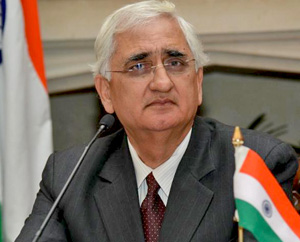
Srinagar, Jun 28: India on Friday said the composite dialogue with Pakistan will be resumed after the new government in the neighbouring country settles down, and pending confidence building measures between the two countries are implemented.
“It is not good that we say everything right at the outset. The atmosphere is good at the moment. Let it improve further to be conducive for talks,” External Affairs Minister Salman Khurshid told reporters in Srinagar.
“Let them (the new government in Pakistan) settle down and understand their job, then we can resume it. However, there are some issues on which both the government and people expect some progress, and we will get some satisfaction from it. Then things can move on smoothly from there,” he said.
The focus of the government, at present, is to resume sectoral dialogue, whereby progress can be made on certain issues, Mr. Khurshid said after addressing Congress workers at the PCC office in Srinagar.
“Our formulation at the moment is to start a sectoral dialogue. The issues on which we can make forward movement, we will do that. There are some issues on which expecting some quick progress is not possible,” he said.
The External Affairs Minister said there are some confidence building measures which are to be implemented by both the countries to further improve the atmosphere.
“There are confidence building measures like the most favoured nation status (to India) which they had decided earlier, but has not been implemented yet and the new visa regime which we have announced and will enable travel of more people across the border is to be implemented. We can move forward one step at a time,” he said.
Mr. Khurshid said the composite dialogue with Pakistan made good progress and was successful, but some “unfortunate incidents” dealt a setback to the process.
“Talks with Pakistan had progressed a long way and were successful. The composite dialogue that we had started had made good progress. Unfortunately, some incidents took place which became a setback to our efforts and under compulsion, the process stopped,” he added.
The Minister said the government has positively viewed the statements made by Pakistan Prime Minister Nawaz Sharif about relations with India during his election campaign, which he reiterated after assuming office.
“Elections have taken place there under a democratic system and Prime Minister Nawaz Sharif, during his election campaign gave statements and hints, and reiterated them after assuming office. We seen them in positive light and we have responded accordingly,” he said.
On the fallout of the U.S. withdrawal next year from Afghanistan on India, Mr. Khurshid said Washington has assured assured that the talks with Taliban will stay within the “red lines” drawn for the purpose.
“When (U.S. Secretary of State John) Kerry was in New Delhi, he told us that as far as our reservations are concerned, no step will be taken that will harm our interests. Red lines have been drawn and we agree with them. Those (Taliban) who come to talk will believe in the constitution, they will down their arms and snap ties with al-Qaeda, if they have any.
“If they remain within these lines -- the U.S. has time and again said they will -- we think the talks can progress.
The basic thing which we have all agreed upon is that the talks should remain in control of Afghanistan as it is their internal matter,” he added.
Mr. Khurshid said the government has had detailed discussion with the U.S. and Afghan President Hamid Karzai on the issue of talks with Taliban.
“We have had a detailed discussion with the U.S. on the issue. We also talked about it with Mr. Karzai when he was here.We have spoken to other countries as well, like Saudi Arabia and the U.K.
“Right now, nobody knows whether the talks (between the US and Taliban) will succeed. Even the US has not expressed confidence that these talks will move forward. It is an attempt,” he said.
Mr. Khurshid said some things happened during the inaugurating of the Taliban office in Qatar, which were not liked by some people.
“We are (now) told these have been rectified,” he said.





Comments
Add new comment